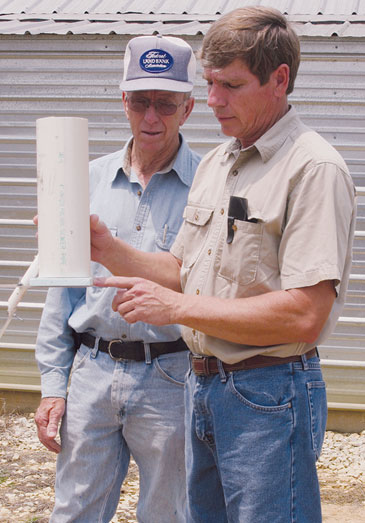For FLBA of South Alabama customers Jerrell and Russell Harden, inventing is a way of life. Ideas come while they are farming, driving and sometimes even sleeping. Since they were featured in Landscapes in 2001, they have obtained two more patents and are working on more.
When a piece of equipment fails to meet their expectations, farmers Jerrell and Russell Harden do not grumble or throw it away in frustration — they start thinking of ways to make it better.

Jerrell and Russell Harden
It is a habit that has resulted in 13 patents so far and numerous patentable inventions for the father and son.
Improving the Farm Operations
They are inventing in their heads all the time, often looking for ways to make their agricultural operations more efficient.
Jerrell, an FLBA of South Alabama customer and retired farmer, lives near Brundidge, Ala. His son, Russell, owns a poultry operation.
Recently, Russell invented an overhead venting system utilizing solar heat, which he installed in his poultry houses. The small unit opens and closes automatically, drawing air from overhead to heat the houses in the wintertime. It warms the air 10 to 18 degrees and reduces heating costs.
The commercial units are 12 vents per house and cost about $1,300. Russell installed 50 small vents per house; it took about an hour per house to install, and cost about $120 per house. Based on the fuel savings, it was time and money well spent. "With the cost of propane these days, any little improvement can save a lot of money," says his father, Jerrell. "That little invention is really neat. Russell enjoys inventing, and he's a natural at it. In fact, he's better than I am."
Patents for Farm Equipment, Health Care
For many years, the Hardens' patents focused mainly on farm equipment. They have sold inventions to eight different companies. Of these, the best known is Ro-Till, which Jerrell developed in the 1970s with his brother Leo.
Ro-Till combines the best of conventional and no-till farming. In one pass, the planter prepares the seedbed; the row is under tillage but mulch remains in the middle, conserving moisture. Today, thousands of units are in operation.
Jerrell's more recent patents, however, have been for health-care equipment. As he and his wife have cared for aging parents, he has realized the need for safer, more convenient products that will help people with disabilities and their caregivers.
For example, he invented a wheelchair lock to prevent falls. He also developed a powered wheelchair that can lift a person weighing up to 400 pounds from a wheelchair into a shower. It is rewarding for him to know that this and other ideas will help people.
Cost of Inventing
Although it requires a big investment of both time and money, the Hardens enjoy the mental exercise that goes into developing something new or improved.
"It is something I enjoy doing, because I like the challenge," Jerrell says. "Inventing is my hobby -- but it's an expensive hobby."
The Hardens estimate that it typically takes about two years and as much as $10,000 to $12,000 to obtain a patent.
Tips for Obtaining a Patent
Jerrell Harden has been through the patent process more than a dozen times. He offers these insights about what you should know.
Do a Search
First, do a patent search. You can do it yourself on the Internet, but an attorney will do a more thorough search. If you hire an attorney, expect to pay about $300 to $600.
Sketch the Idea
You will need to have a drawing of your idea. You can sketch the drawing yourself or hire a draftsman to make a more detailed, accurate drawing. A draftsman usually charges more than $300 for this service.
Pass the "Patent Test"
There are two criteria to pass a patent exam: Is it a novel idea? Is it non-obvious? An idea must be both novel and nonobvious in order to be patented.
Understand the Different Types
There are three types of patents:
1. Utility patents may be granted to anyone who invents or discovers any new and useful process, machine, article of manufacture, or composition of matter, or any new and useful improvement thereof;
2. Design patents may be granted to anyone who invents a new, original and ornamental design for an article of manufacture; and
3. Plant patents may be granted to anyone who invents or discovers and asexually reproduces any distinct and new variety of plant.
For the type of work he does, Harden believes a utility patent is best. There are two types of utility patents: provisional and nonprovisional. The provisional is good for one year. It gives a person more time to do research. You might apply for a provisional patent, and within a year, apply for a nonprovisional patent. The nonprovisional lasts for 20 years.
Hire a Patent Attorney
A patent attorney can help facilitate the patent process. Harden has used attorneys in New York, Washington, D.C. and Birmingham, Ala. Legal fees on average will range from $10,000 to $12,000, although fees for complicated patents could be higher.